Leadership and Management in Service Industries Assignment Report
VerifiedAdded on 2020/11/23
|10
|1791
|469
Report
AI Summary
This report provides an in-depth analysis of leadership and management within the service industry, specifically focusing on Docklands Academy, a large food chain. It begins by assessing classical management theories, such as scientific and bureaucratic management, and their application in a service context. The report then explores the role of leaders, highlighting their importance at various organizational levels and their ability to create a vision for their subordinates. Different leadership styles, including autocratic and democratic approaches, are discussed. The report further reviews management and leadership styles within the selected service sector organization, examining how these styles influence interactions and the coordination of work. Finally, the report investigates the internal and external factors that shape management styles and structures, emphasizing their impact on decision-making and overall business operations within the hospitality sector. The conclusion summarizes the importance of effective leadership and management in achieving organizational goals and adapting to the dynamic business environment.
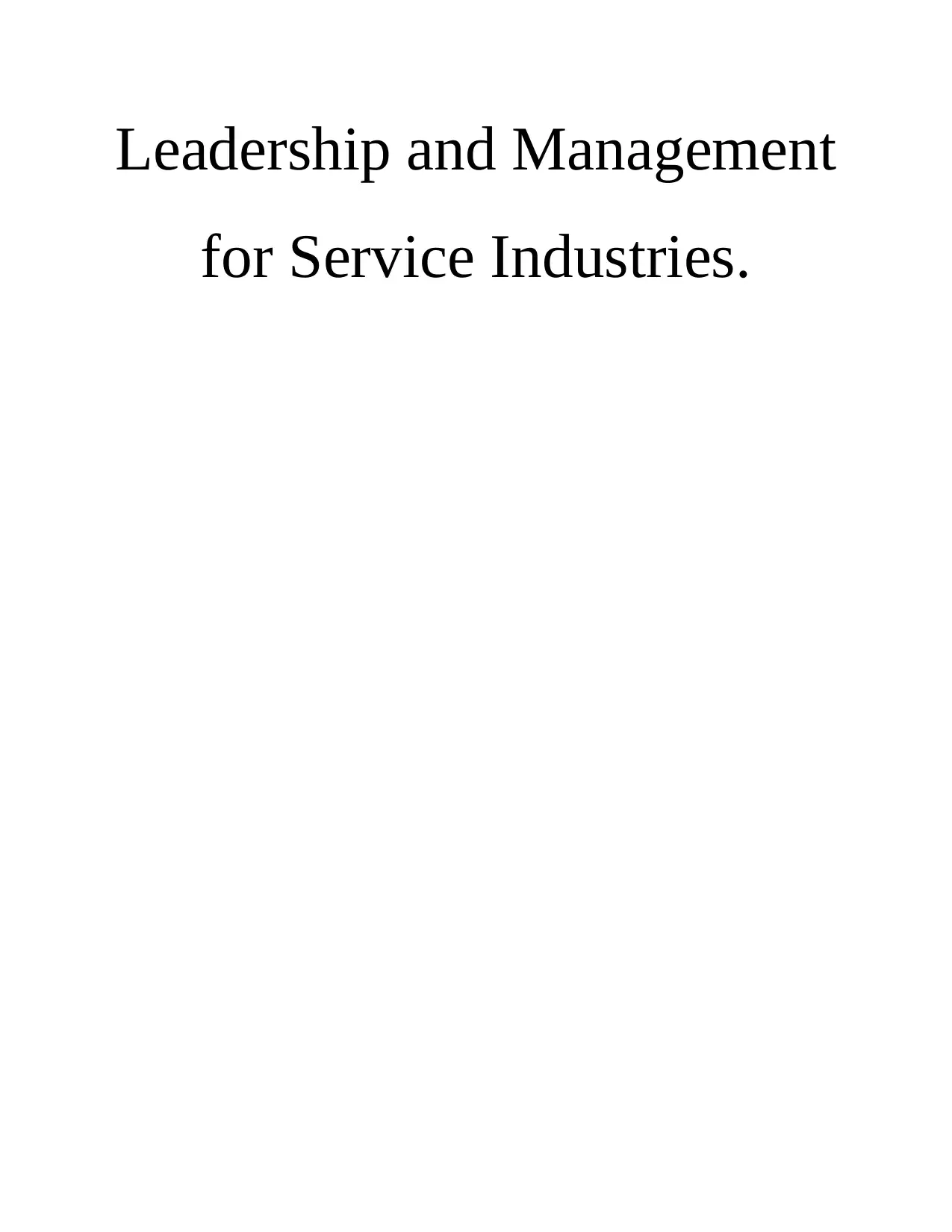
Leadership and Management
for Service Industries.
for Service Industries.
Paraphrase This Document
Need a fresh take? Get an instant paraphrase of this document with our AI Paraphraser
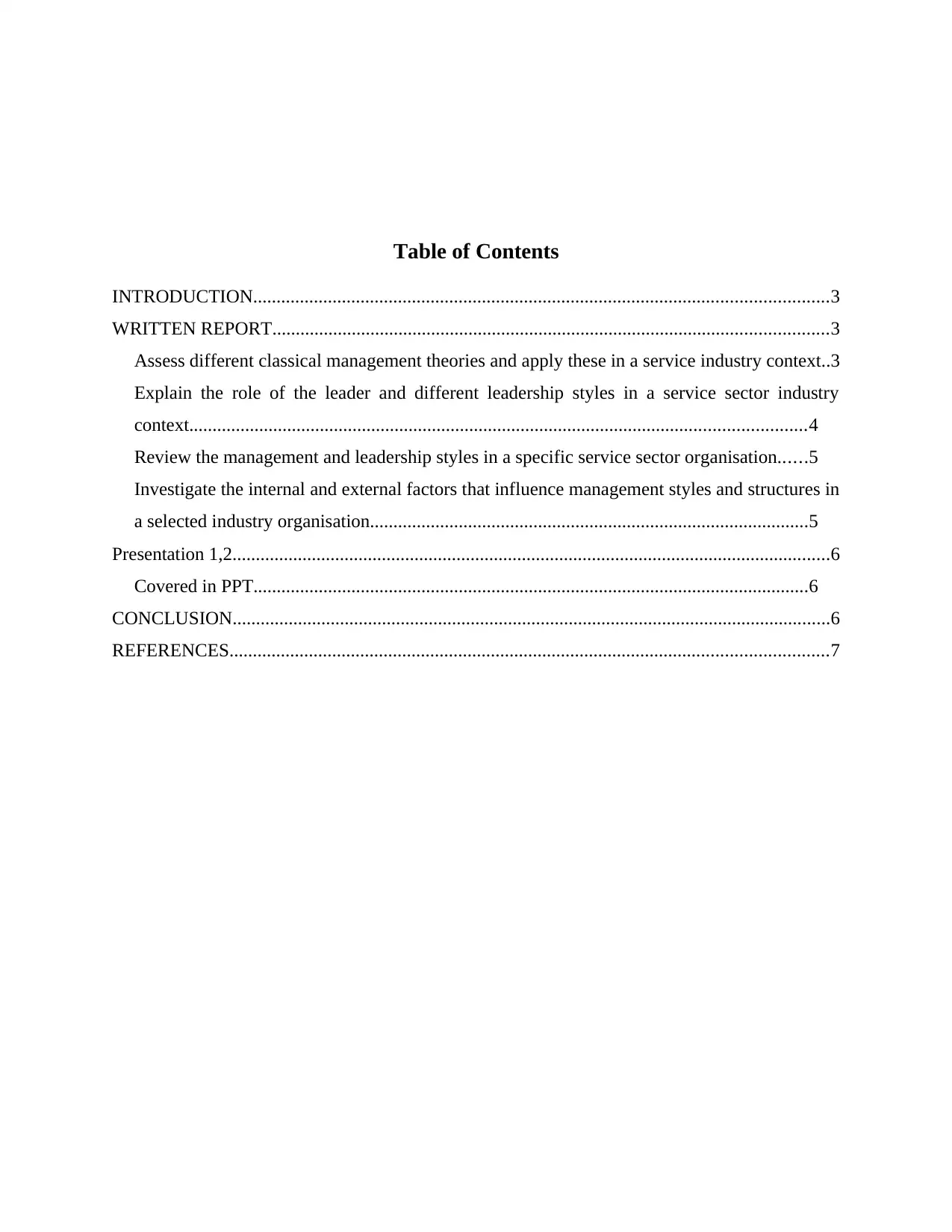
Table of Contents
INTRODUCTION...........................................................................................................................3
WRITTEN REPORT.......................................................................................................................3
Assess different classical management theories and apply these in a service industry context..3
Explain the role of the leader and different leadership styles in a service sector industry
context....................................................................................................................................4
Review the management and leadership styles in a specific service sector organisation......5
Investigate the internal and external factors that influence management styles and structures in
a selected industry organisation..............................................................................................5
Presentation 1,2................................................................................................................................6
Covered in PPT.......................................................................................................................6
CONCLUSION................................................................................................................................6
REFERENCES................................................................................................................................7
INTRODUCTION...........................................................................................................................3
WRITTEN REPORT.......................................................................................................................3
Assess different classical management theories and apply these in a service industry context..3
Explain the role of the leader and different leadership styles in a service sector industry
context....................................................................................................................................4
Review the management and leadership styles in a specific service sector organisation......5
Investigate the internal and external factors that influence management styles and structures in
a selected industry organisation..............................................................................................5
Presentation 1,2................................................................................................................................6
Covered in PPT.......................................................................................................................6
CONCLUSION................................................................................................................................6
REFERENCES................................................................................................................................7
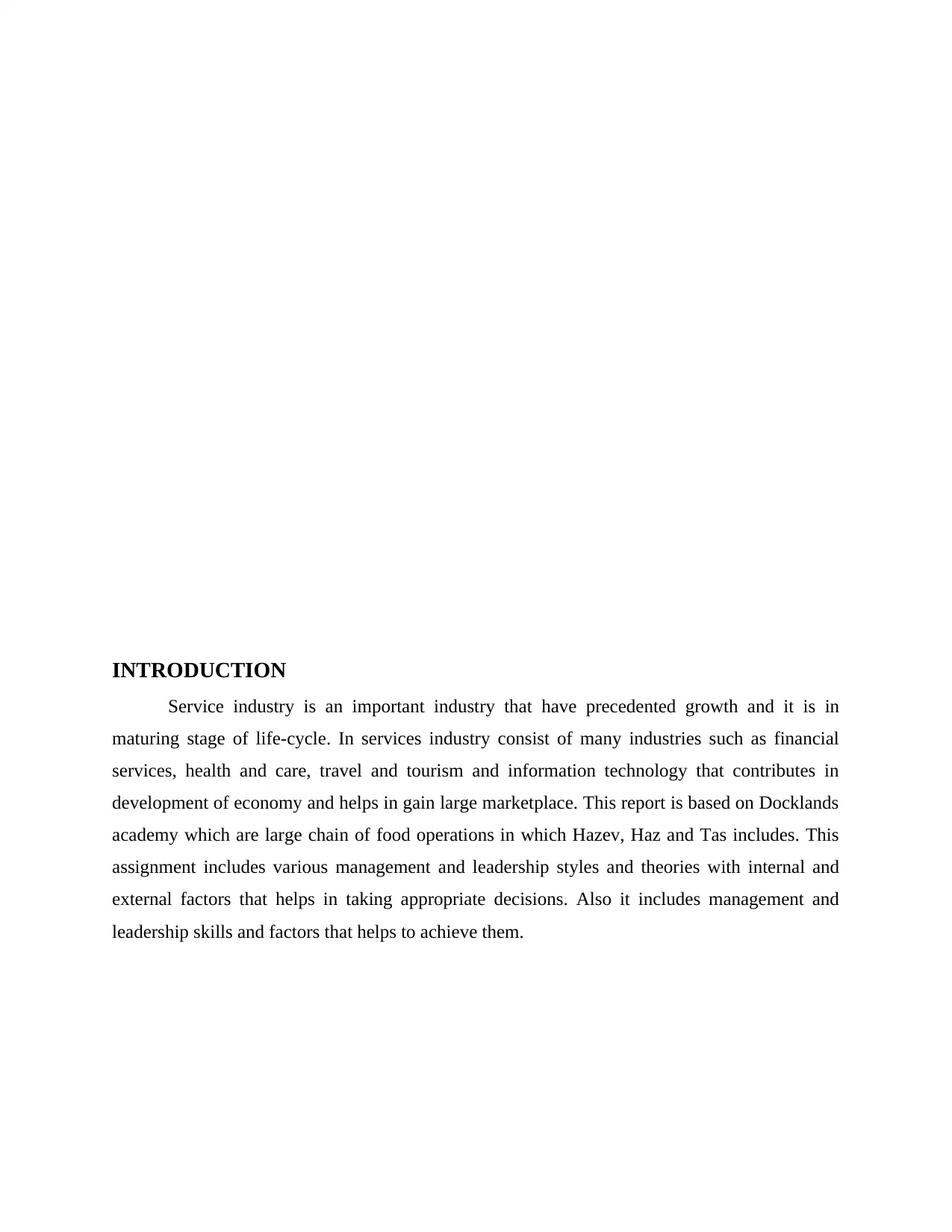
INTRODUCTION
Service industry is an important industry that have precedented growth and it is in
maturing stage of life-cycle. In services industry consist of many industries such as financial
services, health and care, travel and tourism and information technology that contributes in
development of economy and helps in gain large marketplace. This report is based on Docklands
academy which are large chain of food operations in which Hazev, Haz and Tas includes. This
assignment includes various management and leadership styles and theories with internal and
external factors that helps in taking appropriate decisions. Also it includes management and
leadership skills and factors that helps to achieve them.
Service industry is an important industry that have precedented growth and it is in
maturing stage of life-cycle. In services industry consist of many industries such as financial
services, health and care, travel and tourism and information technology that contributes in
development of economy and helps in gain large marketplace. This report is based on Docklands
academy which are large chain of food operations in which Hazev, Haz and Tas includes. This
assignment includes various management and leadership styles and theories with internal and
external factors that helps in taking appropriate decisions. Also it includes management and
leadership skills and factors that helps to achieve them.
⊘ This is a preview!⊘
Do you want full access?
Subscribe today to unlock all pages.

Trusted by 1+ million students worldwide
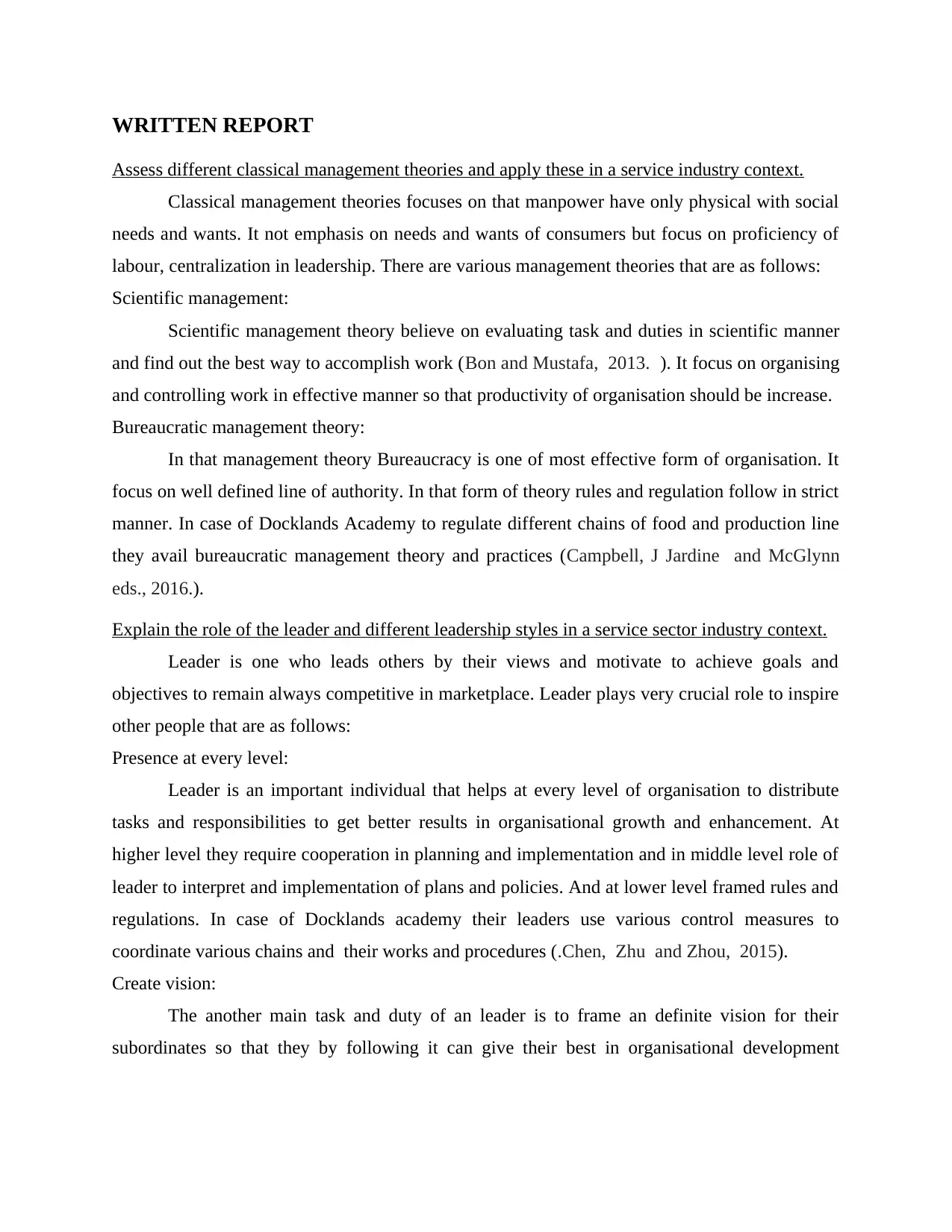
WRITTEN REPORT
Assess different classical management theories and apply these in a service industry context.
Classical management theories focuses on that manpower have only physical with social
needs and wants. It not emphasis on needs and wants of consumers but focus on proficiency of
labour, centralization in leadership. There are various management theories that are as follows:
Scientific management:
Scientific management theory believe on evaluating task and duties in scientific manner
and find out the best way to accomplish work (Bon and Mustafa, 2013. ). It focus on organising
and controlling work in effective manner so that productivity of organisation should be increase.
Bureaucratic management theory:
In that management theory Bureaucracy is one of most effective form of organisation. It
focus on well defined line of authority. In that form of theory rules and regulation follow in strict
manner. In case of Docklands Academy to regulate different chains of food and production line
they avail bureaucratic management theory and practices (Campbell, J Jardine and McGlynn
eds., 2016.).
Explain the role of the leader and different leadership styles in a service sector industry context.
Leader is one who leads others by their views and motivate to achieve goals and
objectives to remain always competitive in marketplace. Leader plays very crucial role to inspire
other people that are as follows:
Presence at every level:
Leader is an important individual that helps at every level of organisation to distribute
tasks and responsibilities to get better results in organisational growth and enhancement. At
higher level they require cooperation in planning and implementation and in middle level role of
leader to interpret and implementation of plans and policies. And at lower level framed rules and
regulations. In case of Docklands academy their leaders use various control measures to
coordinate various chains and their works and procedures (.Chen, Zhu and Zhou, 2015).
Create vision:
The another main task and duty of an leader is to frame an definite vision for their
subordinates so that they by following it can give their best in organisational development
Assess different classical management theories and apply these in a service industry context.
Classical management theories focuses on that manpower have only physical with social
needs and wants. It not emphasis on needs and wants of consumers but focus on proficiency of
labour, centralization in leadership. There are various management theories that are as follows:
Scientific management:
Scientific management theory believe on evaluating task and duties in scientific manner
and find out the best way to accomplish work (Bon and Mustafa, 2013. ). It focus on organising
and controlling work in effective manner so that productivity of organisation should be increase.
Bureaucratic management theory:
In that management theory Bureaucracy is one of most effective form of organisation. It
focus on well defined line of authority. In that form of theory rules and regulation follow in strict
manner. In case of Docklands Academy to regulate different chains of food and production line
they avail bureaucratic management theory and practices (Campbell, J Jardine and McGlynn
eds., 2016.).
Explain the role of the leader and different leadership styles in a service sector industry context.
Leader is one who leads others by their views and motivate to achieve goals and
objectives to remain always competitive in marketplace. Leader plays very crucial role to inspire
other people that are as follows:
Presence at every level:
Leader is an important individual that helps at every level of organisation to distribute
tasks and responsibilities to get better results in organisational growth and enhancement. At
higher level they require cooperation in planning and implementation and in middle level role of
leader to interpret and implementation of plans and policies. And at lower level framed rules and
regulations. In case of Docklands academy their leaders use various control measures to
coordinate various chains and their works and procedures (.Chen, Zhu and Zhou, 2015).
Create vision:
The another main task and duty of an leader is to frame an definite vision for their
subordinates so that they by following it can give their best in organisational development
Paraphrase This Document
Need a fresh take? Get an instant paraphrase of this document with our AI Paraphraser
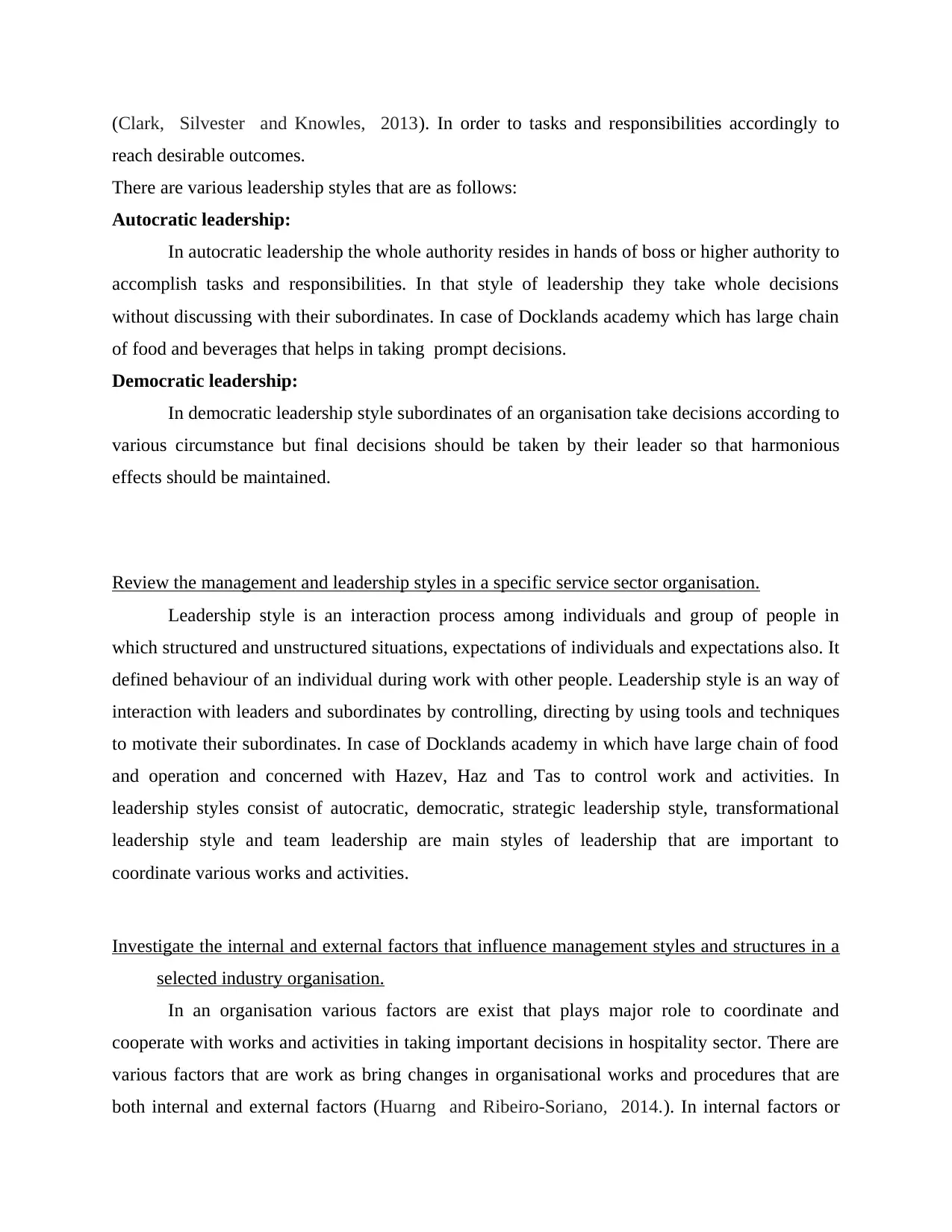
(Clark, Silvester and Knowles, 2013). In order to tasks and responsibilities accordingly to
reach desirable outcomes.
There are various leadership styles that are as follows:
Autocratic leadership:
In autocratic leadership the whole authority resides in hands of boss or higher authority to
accomplish tasks and responsibilities. In that style of leadership they take whole decisions
without discussing with their subordinates. In case of Docklands academy which has large chain
of food and beverages that helps in taking prompt decisions.
Democratic leadership:
In democratic leadership style subordinates of an organisation take decisions according to
various circumstance but final decisions should be taken by their leader so that harmonious
effects should be maintained.
Review the management and leadership styles in a specific service sector organisation.
Leadership style is an interaction process among individuals and group of people in
which structured and unstructured situations, expectations of individuals and expectations also. It
defined behaviour of an individual during work with other people. Leadership style is an way of
interaction with leaders and subordinates by controlling, directing by using tools and techniques
to motivate their subordinates. In case of Docklands academy in which have large chain of food
and operation and concerned with Hazev, Haz and Tas to control work and activities. In
leadership styles consist of autocratic, democratic, strategic leadership style, transformational
leadership style and team leadership are main styles of leadership that are important to
coordinate various works and activities.
Investigate the internal and external factors that influence management styles and structures in a
selected industry organisation.
In an organisation various factors are exist that plays major role to coordinate and
cooperate with works and activities in taking important decisions in hospitality sector. There are
various factors that are work as bring changes in organisational works and procedures that are
both internal and external factors (Huarng and Ribeiro-Soriano, 2014.). In internal factors or
reach desirable outcomes.
There are various leadership styles that are as follows:
Autocratic leadership:
In autocratic leadership the whole authority resides in hands of boss or higher authority to
accomplish tasks and responsibilities. In that style of leadership they take whole decisions
without discussing with their subordinates. In case of Docklands academy which has large chain
of food and beverages that helps in taking prompt decisions.
Democratic leadership:
In democratic leadership style subordinates of an organisation take decisions according to
various circumstance but final decisions should be taken by their leader so that harmonious
effects should be maintained.
Review the management and leadership styles in a specific service sector organisation.
Leadership style is an interaction process among individuals and group of people in
which structured and unstructured situations, expectations of individuals and expectations also. It
defined behaviour of an individual during work with other people. Leadership style is an way of
interaction with leaders and subordinates by controlling, directing by using tools and techniques
to motivate their subordinates. In case of Docklands academy in which have large chain of food
and operation and concerned with Hazev, Haz and Tas to control work and activities. In
leadership styles consist of autocratic, democratic, strategic leadership style, transformational
leadership style and team leadership are main styles of leadership that are important to
coordinate various works and activities.
Investigate the internal and external factors that influence management styles and structures in a
selected industry organisation.
In an organisation various factors are exist that plays major role to coordinate and
cooperate with works and activities in taking important decisions in hospitality sector. There are
various factors that are work as bring changes in organisational works and procedures that are
both internal and external factors (Huarng and Ribeiro-Soriano, 2014.). In internal factors or
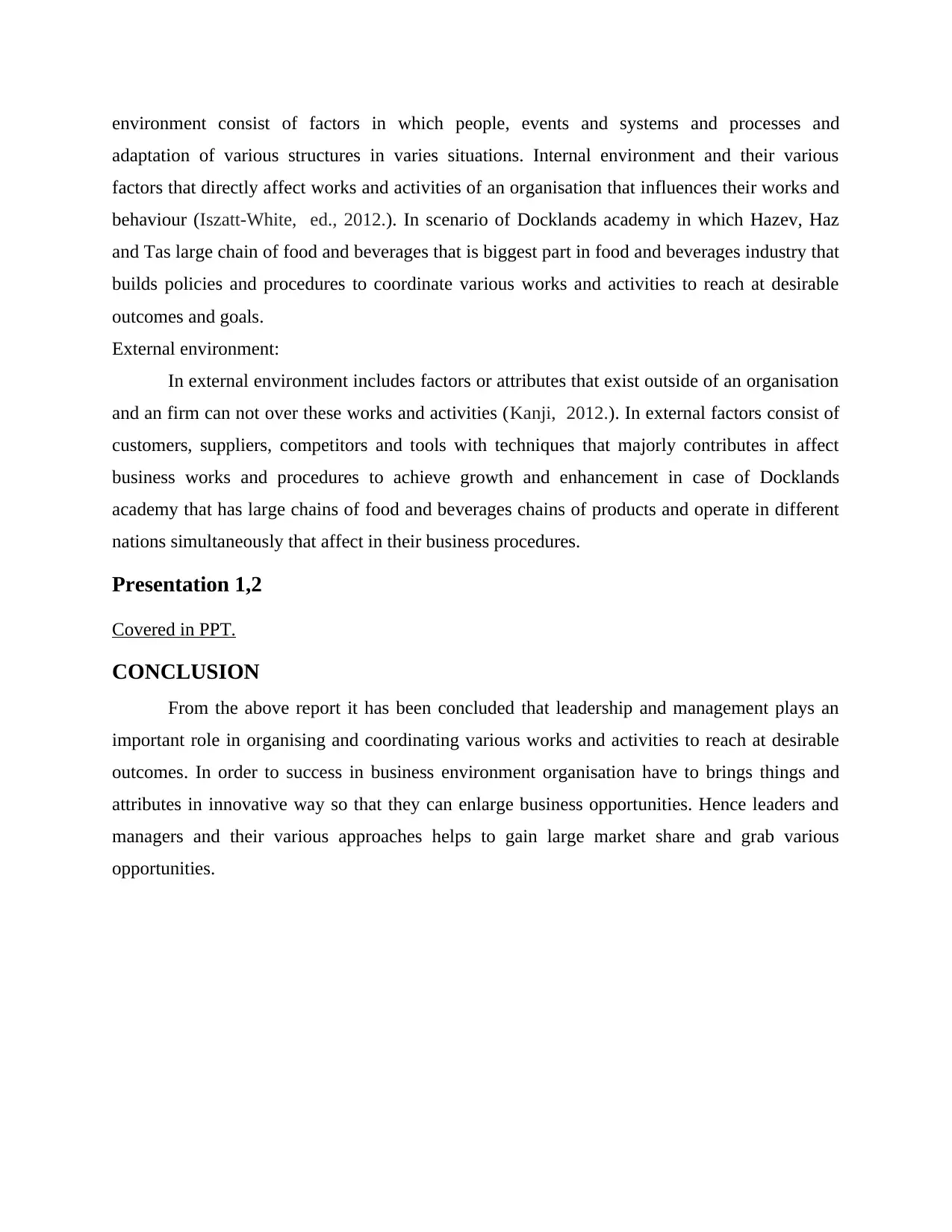
environment consist of factors in which people, events and systems and processes and
adaptation of various structures in varies situations. Internal environment and their various
factors that directly affect works and activities of an organisation that influences their works and
behaviour (Iszatt-White, ed., 2012.). In scenario of Docklands academy in which Hazev, Haz
and Tas large chain of food and beverages that is biggest part in food and beverages industry that
builds policies and procedures to coordinate various works and activities to reach at desirable
outcomes and goals.
External environment:
In external environment includes factors or attributes that exist outside of an organisation
and an firm can not over these works and activities (Kanji, 2012.). In external factors consist of
customers, suppliers, competitors and tools with techniques that majorly contributes in affect
business works and procedures to achieve growth and enhancement in case of Docklands
academy that has large chains of food and beverages chains of products and operate in different
nations simultaneously that affect in their business procedures.
Presentation 1,2
Covered in PPT.
CONCLUSION
From the above report it has been concluded that leadership and management plays an
important role in organising and coordinating various works and activities to reach at desirable
outcomes. In order to success in business environment organisation have to brings things and
attributes in innovative way so that they can enlarge business opportunities. Hence leaders and
managers and their various approaches helps to gain large market share and grab various
opportunities.
adaptation of various structures in varies situations. Internal environment and their various
factors that directly affect works and activities of an organisation that influences their works and
behaviour (Iszatt-White, ed., 2012.). In scenario of Docklands academy in which Hazev, Haz
and Tas large chain of food and beverages that is biggest part in food and beverages industry that
builds policies and procedures to coordinate various works and activities to reach at desirable
outcomes and goals.
External environment:
In external environment includes factors or attributes that exist outside of an organisation
and an firm can not over these works and activities (Kanji, 2012.). In external factors consist of
customers, suppliers, competitors and tools with techniques that majorly contributes in affect
business works and procedures to achieve growth and enhancement in case of Docklands
academy that has large chains of food and beverages chains of products and operate in different
nations simultaneously that affect in their business procedures.
Presentation 1,2
Covered in PPT.
CONCLUSION
From the above report it has been concluded that leadership and management plays an
important role in organising and coordinating various works and activities to reach at desirable
outcomes. In order to success in business environment organisation have to brings things and
attributes in innovative way so that they can enlarge business opportunities. Hence leaders and
managers and their various approaches helps to gain large market share and grab various
opportunities.
⊘ This is a preview!⊘
Do you want full access?
Subscribe today to unlock all pages.

Trusted by 1+ million students worldwide

REFERENCES
Books and journals:
Bon, A.T. and Mustafa, E.M., 2013. Impact of total quality management on innovation in service
organizations: Literature review and new conceptual framework. Procedia Engineering.
53. pp.516-529.
Campbell, J.D., Jardine, A.K. and McGlynn, J. eds., 2016. Asset management excellence:
optimizing equipment life-cycle decisions. CRC Press.
Chen, Z., Zhu, J. and Zhou, M., 2015. How does a servant leader fuel the service fire? A
multilevel model of servant leadership, individual self identity, group competition
climate, and customer service performance. Journal of Applied Psychology. 100(2).
p.511.
Clark, D.M., Silvester, K. and Knowles, S., 2013. Lean management systems: creating a culture
of continuous quality improvement. Journal of clinical pathology. 66(8). pp.638-643.
Huarng, K.H. and Ribeiro-Soriano, D.E., 2014. Developmental management: Theories, methods,
and applications in entrepreneurship, innovation, and sensemaking. Journal of Business
Research. 67(5). pp.657-662.
Iszatt-White, M. ed., 2012. Leadership as emotional labour: Management and the'managed
heart' (Vol. 20). Routledge.
Kanji, G., 2012. Total quality management: proceedings of the first world congress. Springer
Science & Business Media.
Lee, W.I., Chen, C.C. and Lee, C.C., 2015, August. The relationship between internal marketing
orientation, employee commitment, charismatic leadership and performance. In
Proceedings of the 17th International Conference on Electronic Commerce 2015 (p. 1).
ACM.
Sallis, E., 2014. Total quality management in education. Routledge.
Shek, D.T., Chung, P.P. and Leung, H., 2015. Manufacturing economy vs. service economy:
implications for service leadership. International Journal on Disability and Human
Development. 14(3). pp.205-215.
Shek, D.T., Lin, L. and Liu, T.T., 2014. Service leadership education for university students in
Hong Kong: Subjective outcome evaluation. International journal on disability and
human development. 13(4). pp.513-521.
Books and journals:
Bon, A.T. and Mustafa, E.M., 2013. Impact of total quality management on innovation in service
organizations: Literature review and new conceptual framework. Procedia Engineering.
53. pp.516-529.
Campbell, J.D., Jardine, A.K. and McGlynn, J. eds., 2016. Asset management excellence:
optimizing equipment life-cycle decisions. CRC Press.
Chen, Z., Zhu, J. and Zhou, M., 2015. How does a servant leader fuel the service fire? A
multilevel model of servant leadership, individual self identity, group competition
climate, and customer service performance. Journal of Applied Psychology. 100(2).
p.511.
Clark, D.M., Silvester, K. and Knowles, S., 2013. Lean management systems: creating a culture
of continuous quality improvement. Journal of clinical pathology. 66(8). pp.638-643.
Huarng, K.H. and Ribeiro-Soriano, D.E., 2014. Developmental management: Theories, methods,
and applications in entrepreneurship, innovation, and sensemaking. Journal of Business
Research. 67(5). pp.657-662.
Iszatt-White, M. ed., 2012. Leadership as emotional labour: Management and the'managed
heart' (Vol. 20). Routledge.
Kanji, G., 2012. Total quality management: proceedings of the first world congress. Springer
Science & Business Media.
Lee, W.I., Chen, C.C. and Lee, C.C., 2015, August. The relationship between internal marketing
orientation, employee commitment, charismatic leadership and performance. In
Proceedings of the 17th International Conference on Electronic Commerce 2015 (p. 1).
ACM.
Sallis, E., 2014. Total quality management in education. Routledge.
Shek, D.T., Chung, P.P. and Leung, H., 2015. Manufacturing economy vs. service economy:
implications for service leadership. International Journal on Disability and Human
Development. 14(3). pp.205-215.
Shek, D.T., Lin, L. and Liu, T.T., 2014. Service leadership education for university students in
Hong Kong: Subjective outcome evaluation. International journal on disability and
human development. 13(4). pp.513-521.
Paraphrase This Document
Need a fresh take? Get an instant paraphrase of this document with our AI Paraphraser
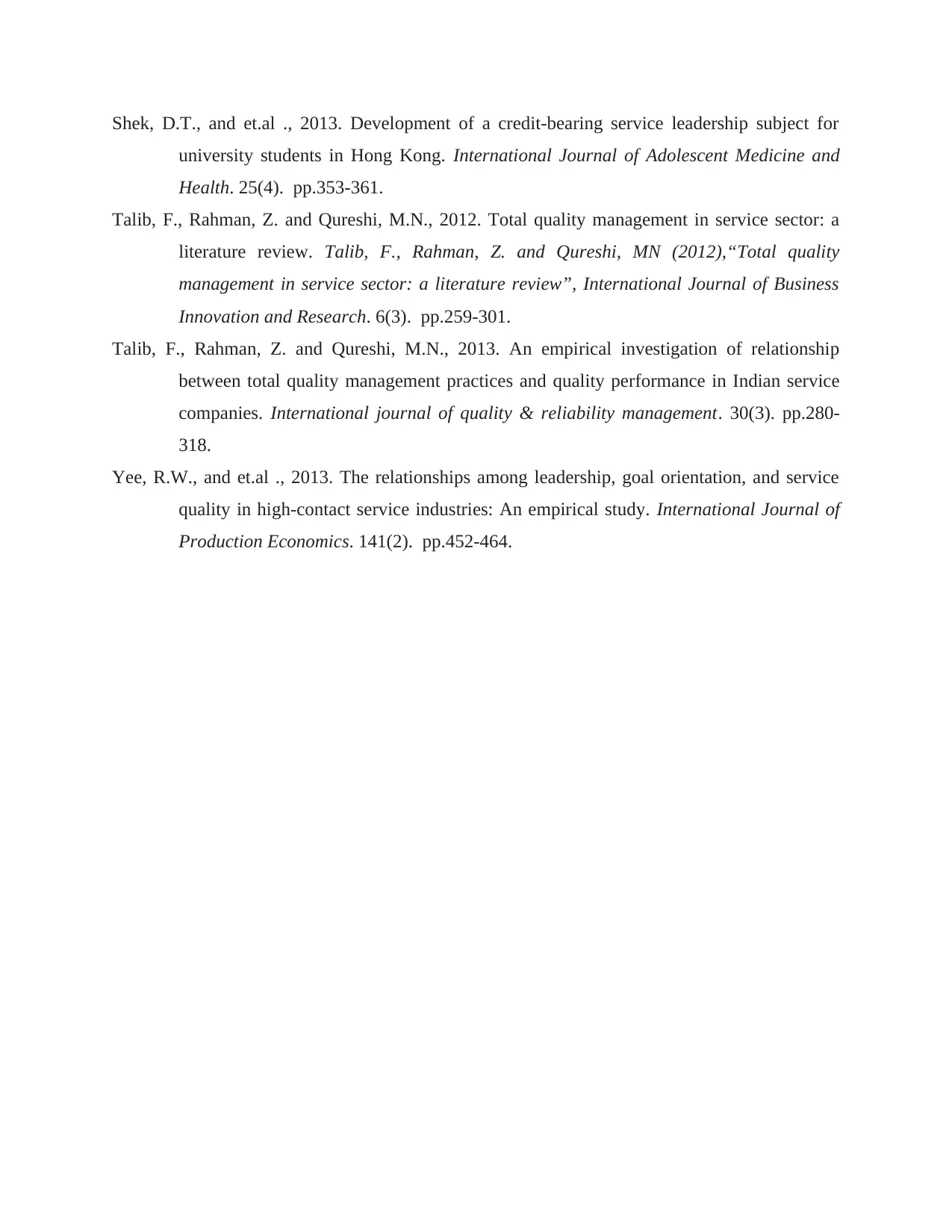
Shek, D.T., and et.al ., 2013. Development of a credit-bearing service leadership subject for
university students in Hong Kong. International Journal of Adolescent Medicine and
Health. 25(4). pp.353-361.
Talib, F., Rahman, Z. and Qureshi, M.N., 2012. Total quality management in service sector: a
literature review. Talib, F., Rahman, Z. and Qureshi, MN (2012),“Total quality
management in service sector: a literature review”, International Journal of Business
Innovation and Research. 6(3). pp.259-301.
Talib, F., Rahman, Z. and Qureshi, M.N., 2013. An empirical investigation of relationship
between total quality management practices and quality performance in Indian service
companies. International journal of quality & reliability management. 30(3). pp.280-
318.
Yee, R.W., and et.al ., 2013. The relationships among leadership, goal orientation, and service
quality in high-contact service industries: An empirical study. International Journal of
Production Economics. 141(2). pp.452-464.
university students in Hong Kong. International Journal of Adolescent Medicine and
Health. 25(4). pp.353-361.
Talib, F., Rahman, Z. and Qureshi, M.N., 2012. Total quality management in service sector: a
literature review. Talib, F., Rahman, Z. and Qureshi, MN (2012),“Total quality
management in service sector: a literature review”, International Journal of Business
Innovation and Research. 6(3). pp.259-301.
Talib, F., Rahman, Z. and Qureshi, M.N., 2013. An empirical investigation of relationship
between total quality management practices and quality performance in Indian service
companies. International journal of quality & reliability management. 30(3). pp.280-
318.
Yee, R.W., and et.al ., 2013. The relationships among leadership, goal orientation, and service
quality in high-contact service industries: An empirical study. International Journal of
Production Economics. 141(2). pp.452-464.

⊘ This is a preview!⊘
Do you want full access?
Subscribe today to unlock all pages.

Trusted by 1+ million students worldwide

1 out of 10
Related Documents
Your All-in-One AI-Powered Toolkit for Academic Success.
+13062052269
info@desklib.com
Available 24*7 on WhatsApp / Email
![[object Object]](/_next/static/media/star-bottom.7253800d.svg)
Unlock your academic potential
Copyright © 2020–2026 A2Z Services. All Rights Reserved. Developed and managed by ZUCOL.





